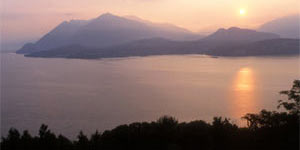Upanishads
Upanishads and Modern Crisis
The modern world is experiencing a far-reaching reassessment in all aspects of human life and thought. Initiated and sustained by the positive sciences and modern technology, this process began as an intellectual movement but soon developed into a dynamic socia-political force. In its methods and results, it was as much a destructive' force as a constructive one. It lifted man from many fears and uncertainties of his primitive past and landed him in new and more gnawing fears and uncertainties. It destroyed many a fable and myth and superstition imbedded in his past traditions, and challenged, and continues to challenge, the credentials of every one of his beliefs and practices in the moral, religious, socio-economic, and other fields of his life.
These are solid gains; but they are not enough; they have 'lengthened the ropes' without, however, 'strengthening the stakes' as the Bible puts it. The tree of life has branched wide without correspondingly rooting deep. In the modern achievement, the sciences of nature have far outstripped the sciences of man, leaving man puny and unstable, with his centre of gravity always outside of himself. Moral and spiritual values emerge only from the sciences of man.
This respect for what is best in man, 'and the science which will proceed to deliver man from bondage to the slavish part of himself', is what the Upanishads developed ages ago in India in her adhyatmavidya, in her science of the inner world of man, in her science of human possibilities', in the words of Julian Huxley. The intellect on which the light of the Atman shines is far different from the intellect which is in thrall to the sense-organs.
These two groups of sciences-the sciences of outer nature and the sciences of inner nature--need to pool their resources together to advance man on the evolutionary path of total fulfilment. 'Take religion away from human society and what remains is a forest of brutes', says Swami Vivekananda.
Lead Kindly Light
The wheel of modern progress revolves faster and faster decade after decade, and man everywhere is feeling dazed and unable to find his bearings. He finds himself deep in a situation where his past is unrecoverable, his present uncertain, and his future an interrogation. Is this the twilight of a day of hope and cheer ahead, or of a night holding gloom and sorrow in store?
 |
Never in human history has man experienced so much darkness within him in the midst of all-round enlightenment outside of him, so much inner poverty In the context of measureless enrichment without, and so much loneliness in the midst of an environing crowd. The modem crisis is thus essentially a spiritual crisis, and modem man is seeking for light to lead him out of the encircling gloom. His heart today is crying for truth, for light, and for life. All these facts indicate that the whole of the modern world is in the throes of a silent spiritual revolution.
The sentiments of the ancient Vedic prayer are echoed ill the silent murmurings, deep searchings, and unspoken prayers of the heart of modern man:
Asato ma sadgamaya;
Tamaso ma Jyotirgamaya;
Mrtyor ma amrtam gamaya
'From the unreal lead me to the Real; from darkness lead me to Light; from death lead me to Immortality.'
To convert this twilight into a twilight of dawn and of a brighter day is the chal1enge facing human knowledge and human wisdom today. Great thinkers of the past and present have held fast to the conviction that the eternal soul of India has preserved, through the ups and downs of her long history, a perennial message of hope and cheer to all humanity.
Swami Vivekananda considered this to be India's distinctive contribution to the sum total of human progress. In a letter written from .America in 1894, the Swami says
'The whole world requires Light. It is expectant! India alone has that Light, not in magic, mummeries, and charlatanism, but in the teaching of the glories of the spirit of real religion of the highest spiritual truth. That is why the Lord has preserved the race through all its vicissitudes unto the present day. Now the time has come.'
This conviction of Vivekananda and other thinkers derives its guarantee from the Upanishads and the living spiritual tradition, intellectually strong, scientific, and therefore universal, flowing from them and getting periodically enriched by spiritual giants like Buddha and Sankara, Ramakrishna and Vivekananda. The Message of the Upanishads will, I hope, enable the reader to test for himself or herse

